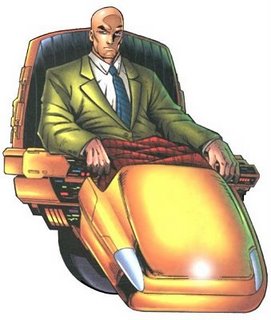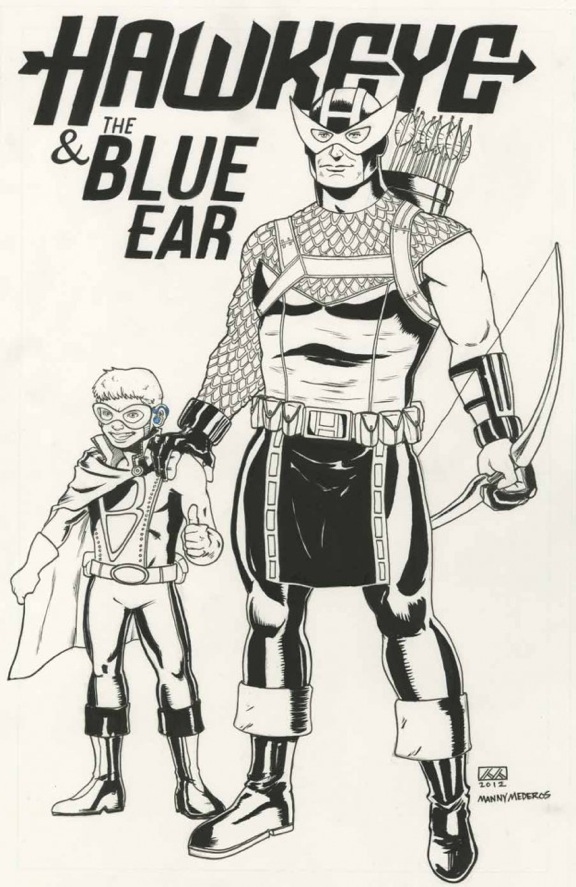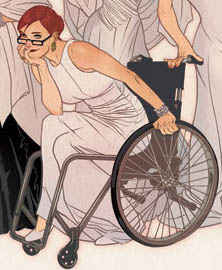Over the years, superhero comics have diversified their roster of characters by adding more female heroes, more heroes of color, with diverse religions and even different sexual orientations, and thus allowed more of their audience to see more of themselves in their heroes. One way I think they can continue to improve is by adding more heroes with disabilities.
As a genre, superheroes explore power and play with what the human body can and cannot do. As such, it’s a perfect forum to portray the lives of the differently abled, what they can do, what they can’t, and how society treats them based on assumptions and prejudice.
In a sense, there have been disabled heroes since the Golden Age, blind heroes and heroes on crutches. But superheroes tend be be dramatically disabled, by vengeful robots or errant rays of radioactivity, and their way of coping with their disability tend to be a superpower all to itself, like bionic arms or turning into Norse Gods, which renders their disability moot.
Daredevil is the classic example of being dramatically disabled. He wasn’t born blind. He was blinded when a canister of radioactive goo smacked him in the eyes, and in exchange for his sight his other senses were superhumanly heightened, giving him “radar” sense. Now, I’m not saying this exchange of senses isn’t interesting—the current Daredevil series by Mark Waid does a fantastic job of showing you in a visual medium how someone who cannot see senses the world—but Daredevil is not blind in a way that a reader who is blind can really identify with.
What I’d like are more heroes with ordinary disabilities, and ordinary means of overcoming their disability, separate and apart from what makes them superheroes. For those, like me, who are near-sighted, it’d be nice to see a superhero who wears glasses not to hide their true identity, or to contain the power of their optic blasts (or as shorthand for being smart, I’m looking at you, Beast) but because they want to read road signs.
 Heroes like Professor X, or Chief of the Doom Patrol, or Barbara Gordon, are good examples of what I’m talking about. People with paralysis who overcome their disability with nothing more extraordinary than a wheelchair (Professor X’s Jim Lee designed hoverchair to the contrary). Smart, capable leaders who change the world.
Heroes like Professor X, or Chief of the Doom Patrol, or Barbara Gordon, are good examples of what I’m talking about. People with paralysis who overcome their disability with nothing more extraordinary than a wheelchair (Professor X’s Jim Lee designed hoverchair to the contrary). Smart, capable leaders who change the world.
Gordon is an especially good example, because unlike others, she did not originate as a character with a disability. She was Batgirl, until, in maybe the worst example of the Women-in-Refrigerators phenomenon, she was crippled and sexually assaulted in a story where she was maybe the fourth lead. She could have had her career as a character ended there, but thanks to a series of writers, notably John Ostrander, Chuck Dixon, Grant Morrison, and Gail Simone, she transformed herself into Oracle, the research librarian for the Justice League, the source of all information for superheroes, and possibly the most powerful person in the DC Universe. All without having her disability undone by synthetic spines, magic potions, time travel, or any other dramatic solution. The message was clear: a wheelchair was no obstacle to becoming the person Batman relied on.
To understand how important that is, you should read Jill Pantozzi’s editorial on the news that, thanks to the latest reboot, Gordon can walk and be Batgirl again. Pantozzi uses a wheelchair herself, and Oracle had been her personal hero. Taking Gordon out of her chair gave Pantozzi the opposite message than before, that you can’t be in a wheelchair and be a superhero. When you read her editorial, you can see how hurtful and ableist that message is.
I think it would be good for DC Comics and Marvel to show that anyone, regardless of race, creed, sex, orientation, or physical capability, could be a superhero, both for the audience to be able to identify with their characters, and also for readers to feel better about themselves.

For example, last May, Christina D’Allesandro wrote to Marvel asking if they knew of any superheroes with hearing disabilities. Not deaf, just with some hearing loss that required them to use a hearing aid. Her four year old son Anthony Smith refused to wear his hearing aid, and she wanted to show him that one can have a disability and still be super. Well, not only did the Marvel editorial staff answer her that Hawkeye uses hearing aids after losing 80% of his hearing, they also created a new superhero that uses his hearing aid to fight crime and named him after Anthony and his hearing aid, the Blue Ear.
We need more heroes like Oracle and Hawkeye. We need more heroes with extraordinary abilities and ordinary disabilities. We need more heroes that the Jill Pantozzis and Anthony Smiths of the world can see themselves in, and in turn see those heroes in themselves. Everybody has the ability to be a hero, to be brave and kind and change the world. It would be good if the world of superheroes reflected that.
Steven Padnick is a freelance writer and editor. By day. You can find more of his writing and funny pictures at padnick.tumblr.com.










